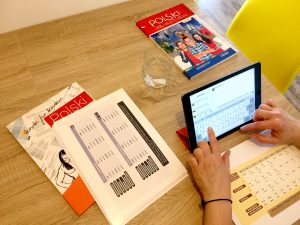Homepage
5 October 2020 2022-01-11 21:12Homepage
Polish for foreigners and Polish communities
We operate globally


Your success is our success

Online teaching

Experienced team

Flexible schedule

About us
Education Athena offers you Polish language teaching for foreigners and Polish communities worldwide. At the moment, we offer individual lessons for our students, as we believe that in such a way we might most effectively meet your expectations. Tailored to your individual capabilities, knowledge of language, needs and interests.
Choose the right one for you!
Sample courses
For children and Polish-diaspora young people, aged 5-15
For adults from Polish communities
For foreigners
Opinions
Why do people choose us?
The opinions of people who have completed the path of language improvement in our school speak for themselves. Do not hesitate, write!
Professional team

Marcel Kowalewski
Client


Make your language perfect with us
Experienced teaching staff will introduce you to the Polish language with great pleasure.
Stay tuned!
The lastest news

Carnaval in Poland
Carnaval in Poland Carnival, differently called “zapusty” is a custom that had its beginning in Poland in the seventeenth century. It spread in Sarmatian Poland. In the past it was celebrated more lavishly than today. It was a time of great feasts, masquerades and games. It begins on the day of Epiphany and ends on Tuesday before Ash Wednesday. The most important part of the holiday begins on Fat Thursday and ends on Tuesday before Ash Wednesday and is traditionally called Ostatkami. Fat Thursday – the name of this day comes from the fact that on this day people traditionally eat doughnuts and faworki. Carnival is a less festive time now than in the past. However, it is still a time of fun, feasting, masked balls, singing, dancing and sleigh rides. Festive time looks a bit differently in different parts of Poland. We would like to focus on a little-known custom from the village of Radziłów in Podlaskie Voivodeship. This custom is called “Ziabela”. The name comes from the couple: a noble man Jan and his young wife Izabela. The couple was known for their extravagant lifestyle and propensity for partying, and according to tradition, they overdid all their spending during the carnival and lost their whole possessions. The example of John and Isabella is a warning to others not to overdo the extravagance. Let us describe how this custom is celebrated. Firstly, the horse pulls a wheel on which the puppets of John and Isabella are placed. The wheel rotates and creates the impression that the couple is dancing on this wheel. They are followed by four men dressed as straw-goblins called “chochoły” symbolizing the passing of winter. They are accompanied by people dressed as goats, bears, and storks. Behind them in a carriage ride the newlyweds: Izabela and Jan, who mock all those who have not found a partner during the carnival. The bride and groom ride through the marketplace and stop in the front of every store where they are offered sweets, snacks and alcohol. The bride and groom are followed in another carriage by guests and residents and passers-by. Everything happens to the accompaniment of music. In the centre of the marketplace the wedding couple is welcomed with bread and salt. The festivities end with the burning of hay from “chochoły”, symbolizing the death of old life and the birth of new. Ziabela is a reason to have fun for people from Radziłów and surrounding villages. More and more people come here from other places in Podlaskie Voivodeship. It is a unique custom. It is an opportunity for performances of local folk song and dance groups. There are also performances of youth dance and singing groups. On the marketplace in Radziłów hot sausages, pea soup, bigos and doughnuts are served. Karnawał w Polsce Karnawał czyli inaczej zapusty to zwyczaj który miał początek w Polsce w XVII wieku. Rozpowszechnił się on w Polsce sarmackiej. Dawniej był obchodzony huczniej niż obecnie. Był to czas wielkich uczt, maskarad i zabaw. Zaczyna się w dniu Trzech Króli a kończy się we wtorek przed Środą Popielcową. Najważniejsza jego część zaczyna się w Tłusty Czwartek a kończy we wtorek przed Środą Popielcową i tradycyjnie jest zwana Ostatkami. Tłusty Czwartek – nazwa tego dnia bierze się stąd, że tego dnia tradycyjnie ludzie jedzą pączki i faworki. Zapusty są obecnie mniej huczne niż w przeszłości. Jednak w dalszym ciągu jest to okres zabawy, ucztowania, balów maskowych, śpiewu, tańców i kulików. Trochę inaczej wyglądają w różnych częściach Polski. Chcielibyśmy się skupić na mało znanym zwyczaju z woj. podlaskiego z miejscowości Radziłów. Ten zwyczaj to „Ziabela”. Nazwa pochodzi od pary: szlachcica Jana i jego młodej żony Izabeli. Para była znana z rozrzutnego trybu życia i skłonności do zabawy, która według tradycji przehulała w czasie karnawału cały swój majątek. Przykład Jana i Izabeli to przestroga dla innych, żeby nie przesadzać z rozrzutnością. Opiszmy jak ten zwyczaj jest obchodzony. Na początku koń ciągnie koło na którym są umieszczone kukły Jana i Izabeli. Koło obraca się i stwarza wrażenia, że para tańczy na tym kole. Za nimi kroczą czterej mężczyźni przebrani za słomiane chochoły symbolizujące odchodzącą zimę. Towarzyszą im też ludzie poprzebierani za kozy, niedźwiedzie, bociany. Za nimi w bryczce jadą nowożeńcy: Izabela i Jan, którzy wyśmiewają tych wszystkich, którzy nie znaleźli sobie partnera w czasie karnawału. Para objeżdża rynek radziłowski i zatrzymuje się przed każdym sklepem, gdzie zostaje obdarowywana słodyczami, zakąskami i alkoholem. Za parą młodą w kolejnej bryczce jadą goście i kroczą okoliczni mieszkańcy i przejezdni. Wszystko dzieje się przy akompaniamencie muzyki. W centrum rynku para ślubna zostaje powitana chlebem i solą. Uroczystości kończą się spaleniem siana z chochołów symbolizując umieranie starego i rodzenie się nowego życia. Ziabela to powód do zabawy dla ludzi z Radziłowa i okolicznych wsi. Coraz częściej przyjeżdżają tu ludzie z dalszych miejscowości województwa podlaskiego. Jest to zwyczaj unikalny. To okazja do występów okolicznych ludowych zespołów pieśni i tańca. Występują też młodzieżowe grupy taneczne i śpiewające. Na rynku radziłowskim są serwowane gorące kiełbaski, grochówka, bigos i pączki.

On-line language teaching
On-line language teaching The last two years have been a period of pandemic. We had to face a small and deadly enemy which is the Covid 19 virus. The pandemic period has “opened” us to work and learn from home. This has become possible thanks to the wide use of the Internet and mobile telephony. Learning and working remotely has become a daily reality for many families. Let’s consider whether online teaching is a good way to learn a foreign language. In the era of the virus, when we try to limit contact with other people, we are sure that online teaching is safe. That there is no way to get infected with the Covid 19 virus from another person and we will not infect another person with this virus. The possibility of remote learning therefore protects our health and life. The important thing is that learning a language online is a great time saving. We don’t have to waste time commuting to school. I remember the time when I was learning English by myself and commuting to school. It took me about 50 minutes one way; besides, I incurred the costs associated with buying a ticket for public transport. I could use the time to get to the school for language learning or other activities if I didn’t have to commute to the school. This opportunity to save time and costs is given to us by remote learning on platforms such as Zoom. We do not have to waste time getting to school and incur financial costs related to commuting: the cost of fuel and parking or buying a ticket for the metro, train or bus. Learning via the Internet is an opportunity for people who have limited access to the school building. They live isolated or in small towns where there are no such schools. Learning the language online is also a great opportunity for people with disabilities. For whom getting to school is not easy or moving around the school is not easy too, because not every school is adapted to the needs of people with disabilities. It is also an opportunity for the elderly or women with small children who have limited opportunities to leave the house. I don’t know you, but the opportunity to learn from my own home appeals to me. When I can learn “at home”, I can sit in my own favourite armchair with a cup of coffee and learn the secrets of the language in such a homely atmosphere. Online teaching is something for enthusiasts of new technologies and the Internet. Who likes to use them and “feel good” in the virtual world. We have tools to use such as: a chat box, white board, the ability to watch and listen to video and audio files, the ability to share the screen and view files on it, and the possibility to work in groups if there is a larger number of students participating in the course. All these possibilities give us the certainty that we can learn all language skills: i.e., reading, writing, speaking and listening. Those are everything that we will learn when we learn in a classroom. To sum up, learning the language online has many positive sides: it saves us time and money to get to the school, gives us the opportunity to learn from the comfort of our own home, is a safer form of learning during the coronavirus pandemic, when every direct contact with another person threatens with serious illness. It also gives the opportunity to learn, which is especially important for people living in isolated places or from small towns, where there is difficult access to a school building. It is also a great way to learn for enthusiasts of modern technologies and the Internet. Nauczanie języka on line Ostatnie dwa lata to okres pandemii. Musieliśmy się zmierzyć z małym i śmiertelnym wrogiem jakim jest wirus Covid 19. Okres panowania pandemii „otworzył” nas na pracę i naukę z domu. Stało się to możliwe dzięki szerokiemu zastosowaniu Internetu i telefonii komórkowej. Nauka i praca zdalna stała się codziennością wielu rodzin. Zastanówmy się czy nauczanie on line to dobry sposób na naukę języka obcego. W dobie wirusa, kiedy staramy się ograniczyć kontakt z drugim człowiekiem mamy pewność, że nauczanie on line jest bezpieczne. Że nie ma możliwości zarażenia się wirusem Covid 19 od drugiego człowieka i my nie zarazimy drugiego człowieka tym wirusem. Możliwość nauki zdalnej chroni więc nasze zdrowie i życie. Ważną rzeczą jaką daje nam nauka języka on line jest duża oszczędność czasu. Nie musimy tracić czasu na dojazdy do szkoły. Pamiętam czas, gdy sama uczyłam się języka angielskiego i dojeżdżałam do szkoły. Zajmowało mi to około 50 minut w jedną stronę, prócz tego ponosiłam koszty związane z kupnem biletu na środki transportu publicznego. Czas na dojazd do szkoły mogłabym wykorzystać na naukę języka czy inne zajęcia, jeślibym nie musiała dojeżdżać do szkoły. Taką możliwość oszczędności czasu i kosztów daje nam nauczanie zdalne na platformach takich jak Zoom. Nie musimy tracić czasu na dojazd do szkoły i ponosić

Who are we?
Who are we? We are an on-line language school. We teach on the Zoom platform. Currently, we offer Polish language learning in the form of individual lessons. The offer is addressed to both Polish communities and foreigners who would like to learn Polish. In the World there are about 20 million people of Polish origin who, at various times in history, decided to go abroad. It was both political and economic emigration. After the Polish joined the European Union in May 2004, many families settled in European countries. Many families would like their children to learn Polish. To learn not only the language, but also Polish culture, art, history and geography. We want to help such families. We want to invite their children to our school to learn Polish with us and learn everything that is related to Polishness. There is a large, about 10 million Polish community in the United States. Poles also lives in such countries as Argentina, Brazil, Australia, Canada. In our offer we have courses for children and teenagers aged 5-15 years. We also offer courses for adults from Polish communities. There are Poles living abroad who are already maybe the second or third generation and would like to “refresh” their knowledge of the Polish language or learn it, because their own family has never taught them for some reasons. Our offer is also addressed to foreigners: future students studying in Poland. To people who have a Polish spouse and would like to communicate with him/her or his/her family in the Polish language and get to know Poland, its culture and history. It is also addressed to language enthusiasts who want to explore the “secrets” of the Polish language. After the fall of communism and the “opening” of Poland to the “World”, especially after joining the European Union, Poland became an important trade partner. Hence our offer for people who would like to learn the business Polish language to be able to talk to their partners in Polish in Poland. Poland is increasingly becoming a destination for holiday trips. It has a lot to offer: colorful and heroic over 1000 history, interesting architecture and art, seaside resorts, mountain ranges; especially the Tatra Mountains with picturesque Zakopane or the richness of the land of Masuria lakes. That is why we offer you a course: language Polish “on vacation”. We will familiarize you with useful vocabulary on a holiday trip to Poland. So, you can ask about the direction, order dinner, buy a ticket or have a simple conversation with the hotel staff in Polish. For people who already know the language Polish at a minimum basic level, we offer conversations in Polish. The purpose of these conversations is to practice speaking proficiency. If you have more time, we invite you to our holiday courses. Depending on your capabilities, we can offer intensive courses, i.e. e.g. 3-4 hours a day, e.g. five times a week. We offer courses in the form of one, two and three month packages. Individual pricing of courses is also possible. In addition to the primary goal, i.e. learning the Polish language, we consider our mission to spread knowledge about Poland: its history, culture, art and geography. In the form of a newsletter, social media posts or videos on YouTube, we will familiarize you with the language and its grammar and everything related to Poland. We also hope that in the future we will organize trips to Polish. You will be able to check your language level yourself and get to know Poland personally. We cordially invite you to our online school Education Athena! Kim jesteśmy? Jesteśmy szkołą językową on line. Uczymy na platformie Zoom. Obecnie oferujemy naukę języka polskiego w formie indywidualnych lekcji. Oferta jest kierowana zarówno do środowisk polonijnych jak i cudzoziemców, którzy chcieliby się nauczyć języka polskiego. Na świecie poza Polską mieszka około 20 milionów ludzi pochodzenia polskiego, którzy w różnych okresach historii postanowili wyjechać za granicę. Była to emigracja zarówno polityczna jak i zarobkowa. Po wstąpieniu Polski do Unii Europejskiej w maju 2004 roku wiele rodzin zamieszkało w krajach europejskich. Wiele rodzin chciałoby, żeby ich dzieci uczyły się języka polskiego. Żeby poznały nie tylko język polski, ale również polską kulturę, sztukę, historię i geografię. Chcemy pomóc takim rodzinom. Chcemy zaprosić ich dzieci do naszej szkoły, żeby uczyły się języka polskiego z nami i poznawały wszystko to co jest związane z polskością. Istnieje duża, około 10 milionowa społeczność polonijna w Stanach Zjednoczonych. Polonia mieszka też w takich krajach jak Argentyna, Brazylia, Australia, Kanada. W naszej ofercie mamy kursy dla dzieci i młodzieży w wieku 5-15 lat. Również oferujemy kursy dla dorosłych ze środowisk polonijnych. Za granicą mieszkają Polacy, którzy są już może drugą, albo trzecią generacją i chcieliby „odświeżyć” znajomość języka polskiego czy go się nauczyć, bo nigdy nie nauczyła ich dla pewnych powodów własna rodzina. Oferta nasza jest skierowana również do obcokrajowców: przyszłych studentów studiujących w Polsce. Do ludzi którzy mają polskiego małżonka i pragnęliby komunikować się z nim czy jego rodziną w polskim języku oraz poznać Polskę, jej kulturę i historię. Skierowana też jest do pasjonatów językowych, którzy chcą zgłębić „tajniki” języka polskiego. Po upadku komunizmu i „otwarciu” Polski na „Świat”, szczególnie po wstąpieniu do Unii Europejskiej Polska stała się ważnym partnerem handlowym. Stąd nasza oferta dla osób które chciałyby poznać język polski „businessowy”, żeby w Polsce móc rozmawiać z ich partnerami po polsku. Polska coraz częściej staje się kierunkiem wyjazdów wakacyjnych. Ma wiele do zaoferowania: barwną i heroiczną ponad 1000 historię, interesującą architekturę i sztukę, kurorty nadmorskie, pasma górskie; szczególnie Tatry z malowniczym Zakopanem czy bogactwo krainy jezior mazurskich. Dlatego oferujemy Państwu kurs: język polski „na wakacjach”. Zapoznamy Państwa ze słownictwem użytecznym na wyjeździe wakacyjnym do Polski. Żebyście Państwo mogli zapytać o kierunek, zamówić obiad, kupić bilet czy przeprowadzić prostą rozmowę z obsługą hotelową w języku polskim. Dla osób, które znają już język polski w stopniu minimum podstawowym proponujemy konwersacje w języku polskim. Celem tych konwersacji jest ćwiczenie biegłości mówienia. Jeśli dysponują Państwo

Subscribe to the newsletter
Enter your email address and we will make sure that you receive the latest information about our school.

 Artdot.pl
Artdot.pl